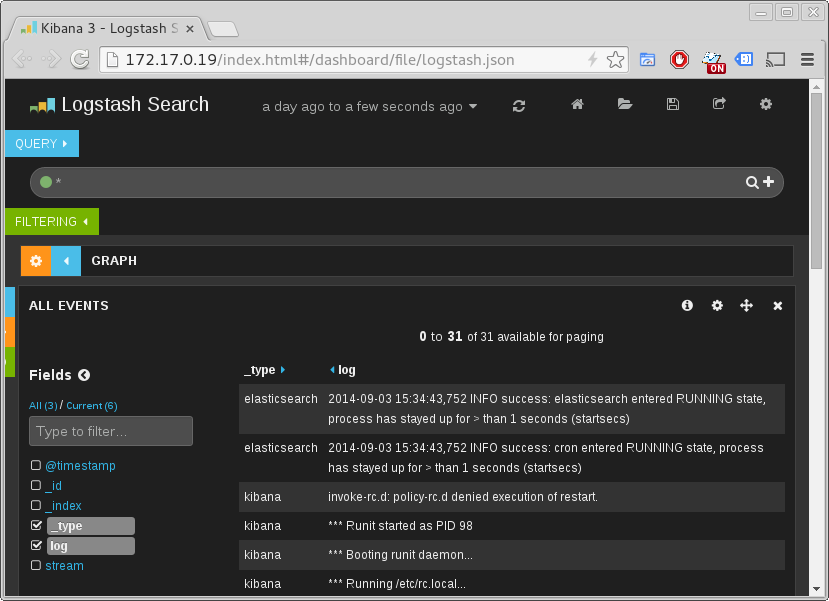docker-log-collector
A Docker container that collects the Docker logs of all running containers using fluentd. By default, it passes everything along to an ElasticSearch container linked in as es1.
docker run -td \
-v /var/run/docker.sock:/var/run/docker.sock \
-v /var/lib/docker/containers:/var/lib/docker/containers \
--link elasticsearch:es1 \
--name collector bprodoehl/log-collector
This is based on the very excellent article at http://jasonwilder.com/blog/2014/03/17/docker-log-management-using-fluentd/, with a pile of real-world fixes added on top so that it all actually works, and time formats are properly parsed, and the logs can be read with Kibana, and so on.
Watch the logs from all your local containers with Kibana
You can easily watch and analyze the logs from all of your containers by combining this container with Kibana. As you can see in the screenshot below, each line of output from each locally-running container will show up in Kibana, with the _type field set to the container name and the log field containing the message.
This sample script will launch the containers necessary to watch the logs from all of your locally-running Docker containers, and will open Kibana in your default browser. The script, and an accompanying script to tear everything down, is also in the doc folder.
#!/bin/bash
### Pull the necessary containers
docker pull balsamiq/docker-elasticsearch
docker pull bprodoehl/kibana
docker pull bprodoehl/log-collector
### Launch them
# Launch ElasticSearch
docker run -d \
--name elasticsearch \
--hostname elasticsearch \
balsamiq/docker-elasticsearch
# Launch Kibana
docker run -d \
-e KIBANA_SECURE=false \
--link elasticsearch:es \
--name kibana \
--hostname kibana \
bprodoehl/kibana
# Launch the log collector
docker run -d \
-v /var/run/docker.sock:/var/run/docker.sock \
-v /var/lib/docker/containers:/var/lib/docker/containers \
--link elasticsearch:es1 \
--name collector \
--hostname collector \
bprodoehl/log-collector
### Open up Kibana in your default browser
OPEN_CMD=open
for cmd in xdg-open gnome-open sensible-browser open;
do
which $cmd &> /dev/null
if [ 0 == $? ]; then
OPEN_CMD=$cmd
break
fi
done
echo Opening Kibana in default browser with $cmd
KIBANA_IP=`docker inspect --format '{{ .NetworkSettings.IPAddress }}' kibana`
$OPEN_CMD "http://$KIBANA_IP/index.html#/dashboard/file/logstash.json"